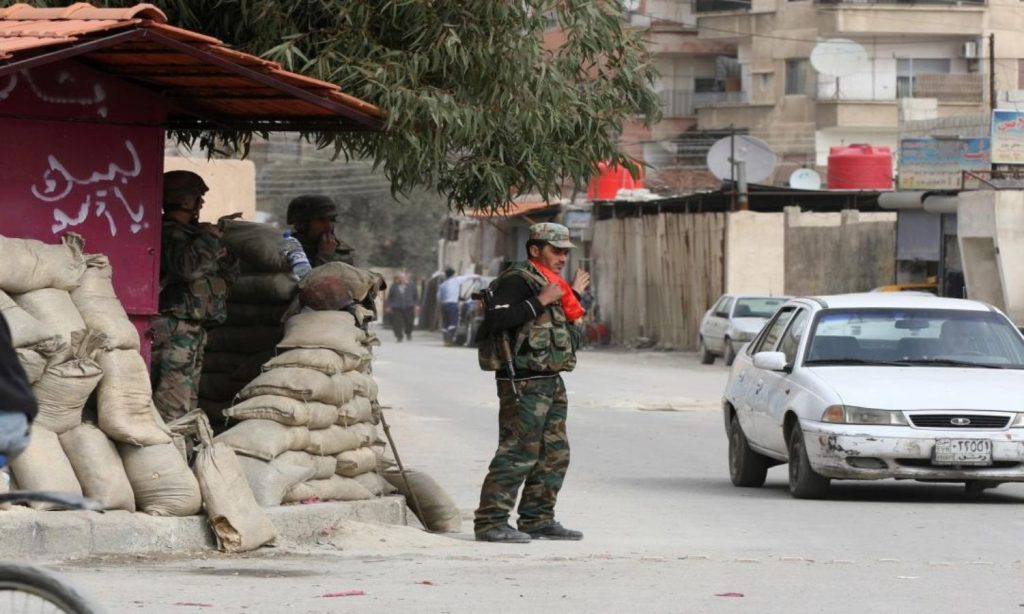Homs – Orwah al-Mundhir
Many Syrians, inside or outside the country, are forced to appoint offices to handle their transactions, forcing them to pay sums that exceed the costs of running them. However, the biggest and most costly challenge is the Syrian regime’s imposition of obtaining a “security clearance,” which has become a stumbling block to the completion of any administrative requirement.
The security clearances included all government transactions in various fields, such as procedures for transferring ownership, ending commonage, obtaining passports, employment, retirement applications, and holding weddings.
This clearance opened the door wide to blackmail the Syrians so that they would complete their transactions, and it became a door to blackmail and bribes through which the security services get the largest share compared to the fees of those who follow up the transactions.
These procedures forced the owners of transaction processing offices to communicate with security branches and detachments, open channels of bribes to accomplish their work, and charge large sums of money even if the documents are legal and there is no legal impediment to obtaining them.
Half the cost for the “security clearance”
Transaction handlers suffer from the problem of having to obtain a security clearance, which has increased their financial burdens and delayed the completion of transactions.
Louay (pseudonym for security reasons), one of the transaction handlers in Homs, told Enab Baladi that the security approvals hindered the handlers’ work “because of the delay in issuing them without paying money.”
He added that many transactions cannot be completed due to the inability of their owners to obtain security clearances if there is a name of one of the wanted persons in the transaction, which costs them effort and time for nothing.
Louay explained that the security personnel responsible for the security permits, in the absence of transactions to complete them, visit the offices of the transaction handlers and ask for money, while the owners of the offices charge these amounts for the transactions that will be completed in the future, which increases the costs of completing the transactions.
After it was imposed by the government of the regime, the security branches allowed their members to collect money through security clearances in Homs, which turned the handlers of transactions into “brokers” with the studies’ members, who collect sums for them from the owners of transactions in exchange for obtaining approvals quickly.
Youssef, 48, who asked not to reveal his full name for security reasons, lives in al-Qusour neighborhood in Homs. He told Enab Baladi that he had to pay 150,000 Syrian pounds in exchange for obtaining a security clearance that allowed him to sell his apartment in the neighborhood recently, although he passes through security checkpoints and there is no “research paper” or “security review request” in his name.
Youssef assigned one of the transaction handlers to complete the property transfer transaction as soon as possible, as he ensured obtaining approval, and Youssef indicated that he obtained it after paying the amount within two days.
Regarding the reason for his urgency to sell the house and obtain permit, Youssef explained that he wanted to collect the price of the house and transfer the amount to gold due to the recent instability of the currency value.
In the event that he does not pay the amount requested by the transaction follower for security approval, extracting it requires a period of at least 20 days, which threatens to lose the value of the house.
Real estate outside bribery accounts
Although the door to bribery is open to obtaining security clearances, real estate affairs have special conditions, and property transfer transactions do not receive security approvals if the owner of the property or the buyer is wanted, which impedes the process of transferring ownership.
Youssef, a father of three young men who own agricultural land in the al-Houla Plain, told Enab Baladi that his children have been trying to sell their land for three years, to no avail, because one of them is a military deserter from compulsory service since 2014, which prevents them from obtaining security approval.
Youssef, who requested that his full name not be mentioned for security reasons, added that the sale process can take place through a court ruling in favor of the buyer, but each dunum will lose about one million Syrian pounds, and despite his attempt to conduct the transaction through a transaction tracking office in return for paying sums of money, he could not obtain the security clearance.
Among the issues that added a burden to citizens and limited their freedom to dispose of their property was the issuance of a government circular to the Ministry of Local Administration in 2015 stipulating adding real estate sales, rental operations, and vacating houses and shops to cases that require prior security approval from the competent authorities.
Despite the passage of seven years since the circular, which the government justified at the time by prohibiting the purchase or rent of real estate by “terrorists” and taking it as their headquarters, and by protecting real estate property from loss or forgery, the circular is still valid, according to which the real estate registrar is now required to obtain security approval to register the transfer of real estate ownership.
According to a report by the Syrians for Truth and Justice (STJ) organization, issued early this month, security approvals have become, during the years of conflict, a condition for renting an apartment, licensing a shop, selling real estate, establishing a tourism, industrial, or commercial project, issuing public or private agencies, issuing a university degree document, obtaining licenses to conduct social, cultural and religious activities, and many others.
The rights organization indicated that the exceptions issued for transactions that require security approval in Syria were either “formal” or related to foreign exchange for the state treasury from Syrians abroad.

